|
123 Sandwich Road
Cliffsend
https://whatpub.com/sportsman
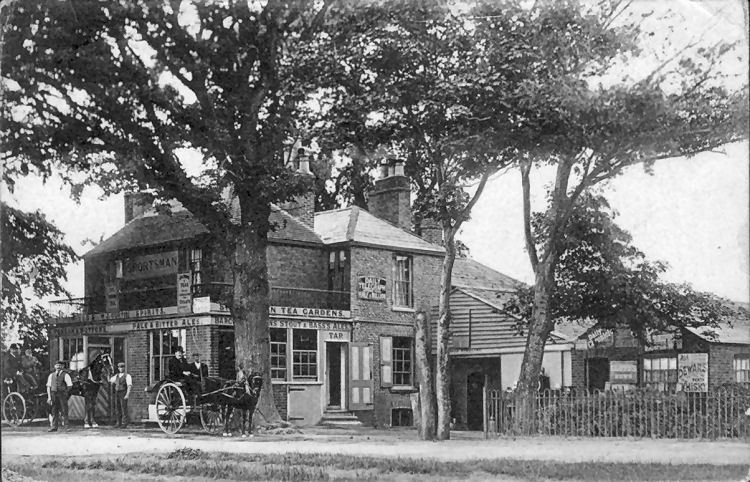
Above postcard, 1906. |
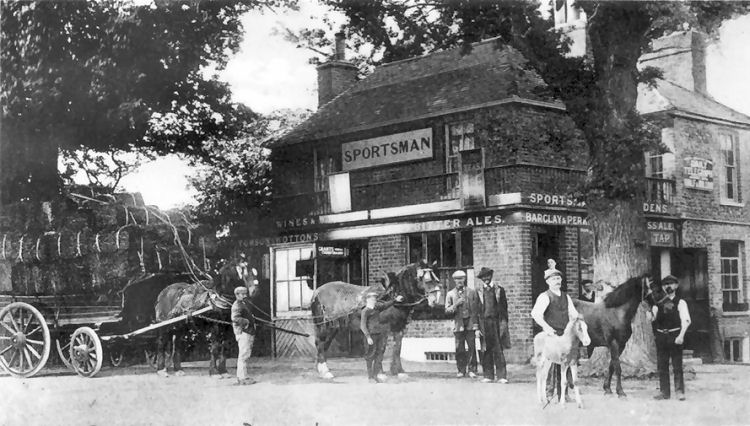
Above postcard dated 1910. |
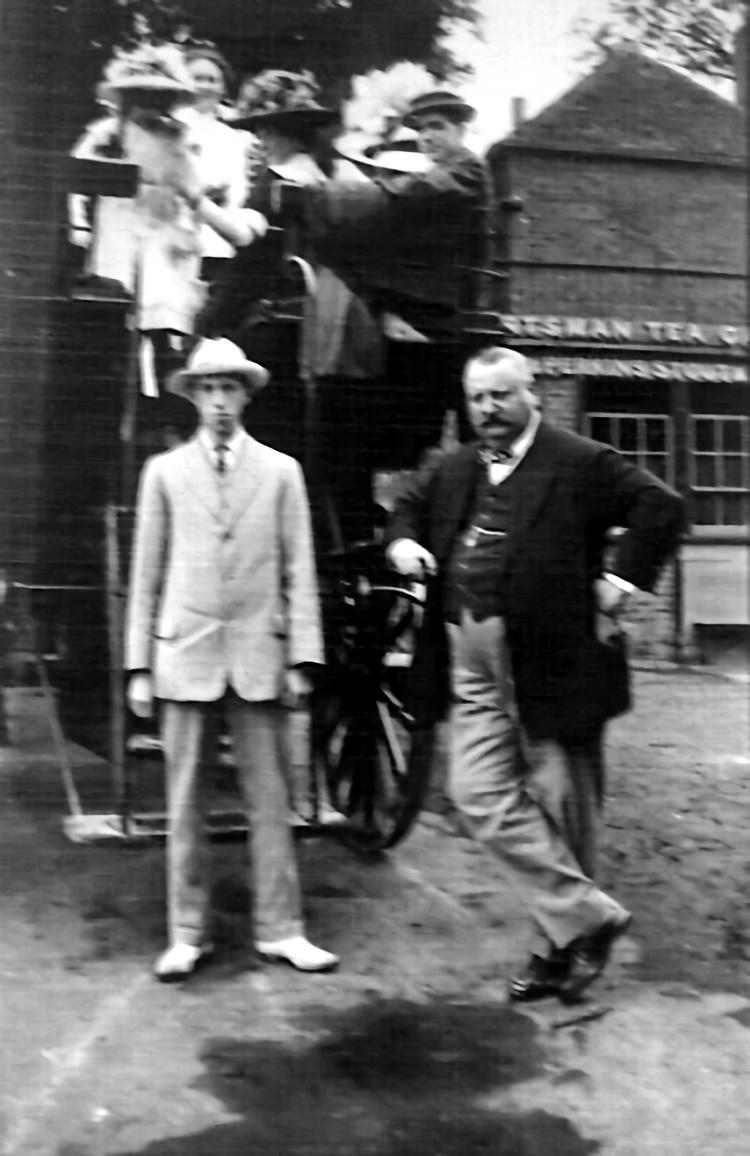 Above
photo, circa 1911, kindly sent by Rory Kehoe. People in photo as yet
unknown. |
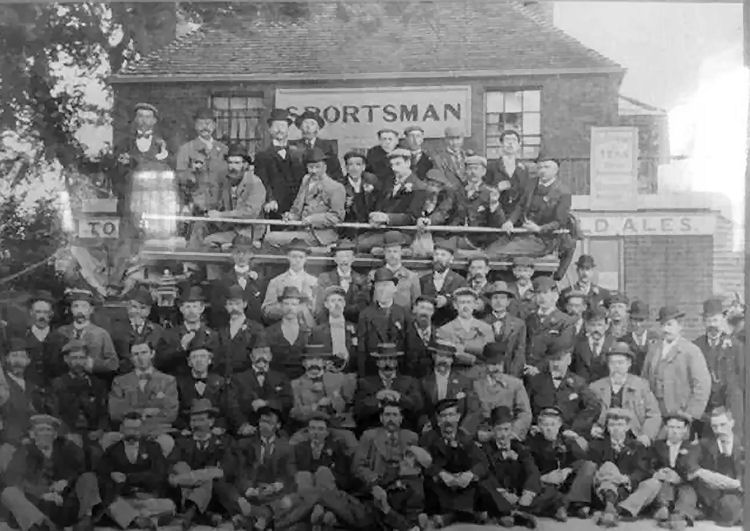
Above photo showing an outing, 1904. The photo is believed to show
the directors and staff of Tomson & Wotton's Ramsgate Brewery. What the
occasion was and why, apart from it being a Tomson & Wotton's tied
house, the works outing stopped at the Sportsman to stage this
photograph isn't known. |
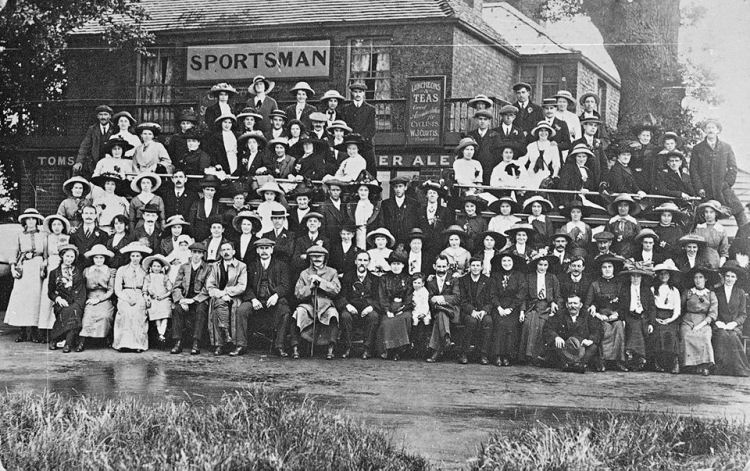
Above photo, date unknown, kindly sent by Paul Wells. |
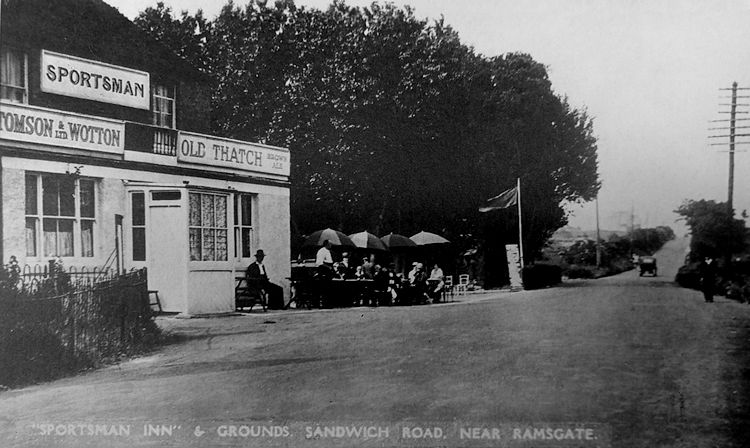
Above photo, circa 1930. According to some notes on the back of this
photo, the Sportsman dated back to 1750 and became a Tomson & Wotton
house in 1872, when the Ramsgate Brewery purchased the lease. The "Old
Thatch" sign referred to Tomson & Wotton's bottled brown ale. Kindly
sent by Rory Kehoe. |
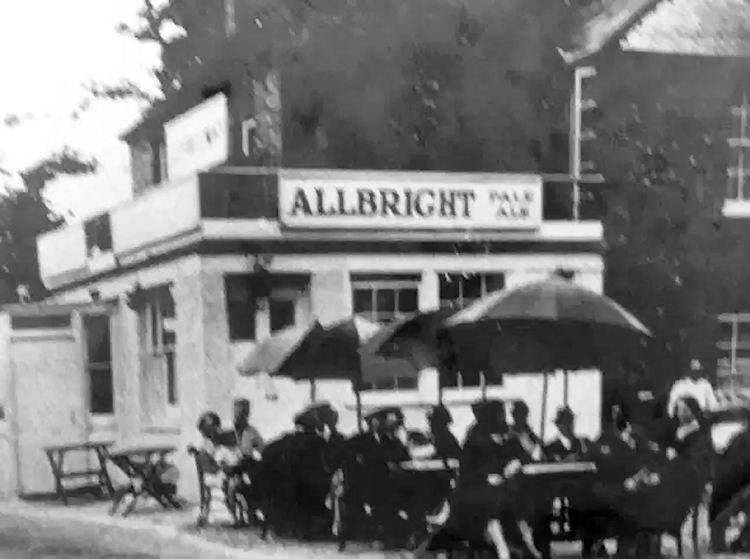
Above photo, date circa 1938 showing the pub in the Tomson and Wotton days. |
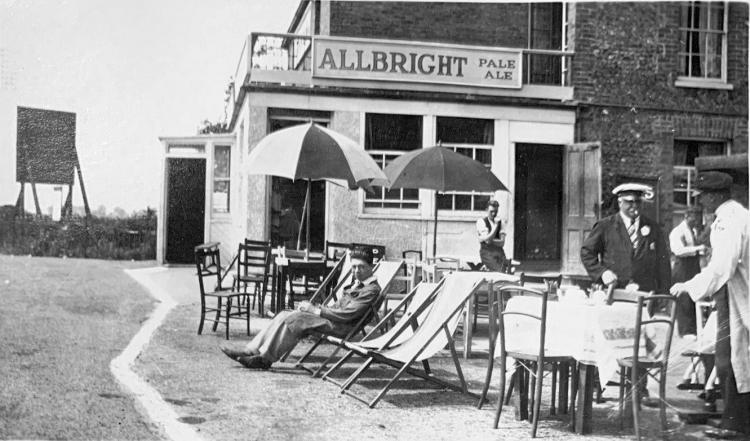
Above photo, circa 1938, kindly sent by Rory Kehoe. |
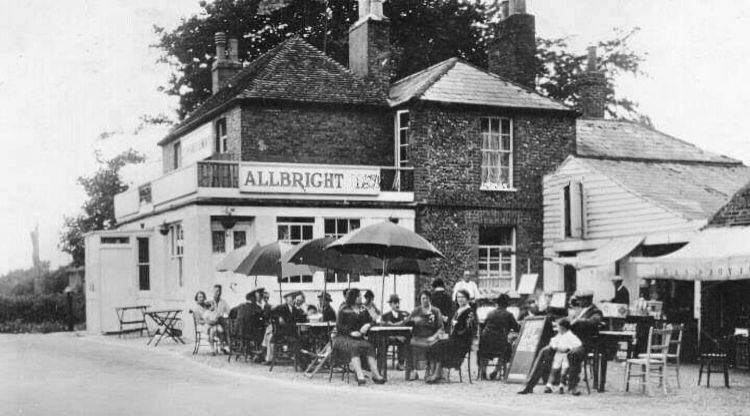
Above photo, circa 1938. |
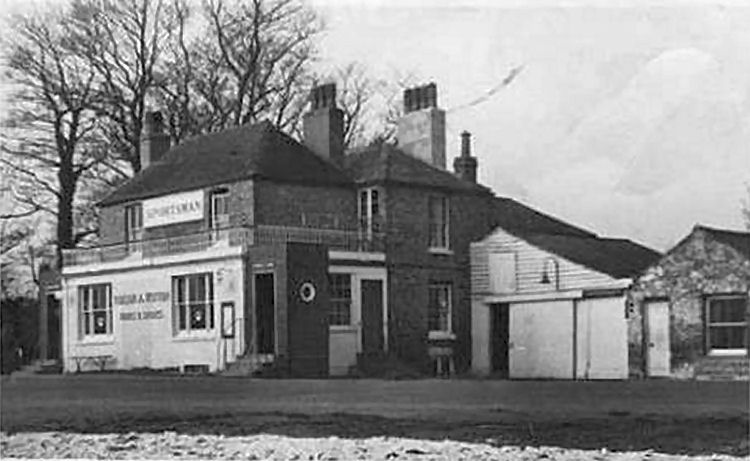
Above postcard, date 1952, kindly sent by Mark Jennings. |
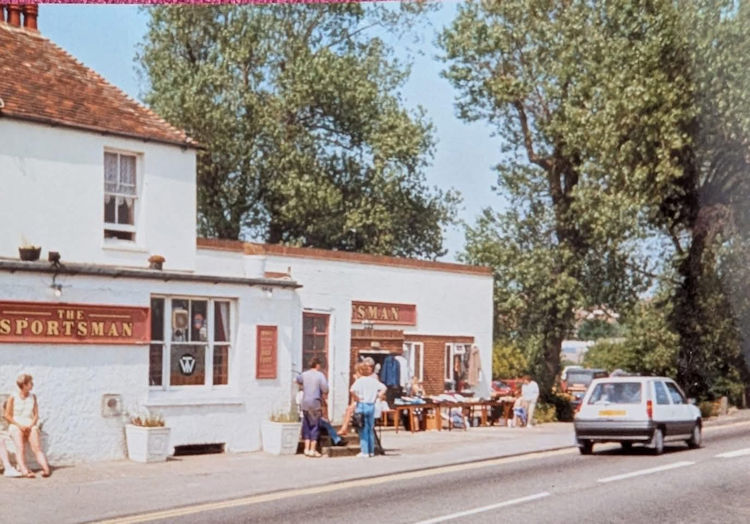
Above photo circa 1990. |

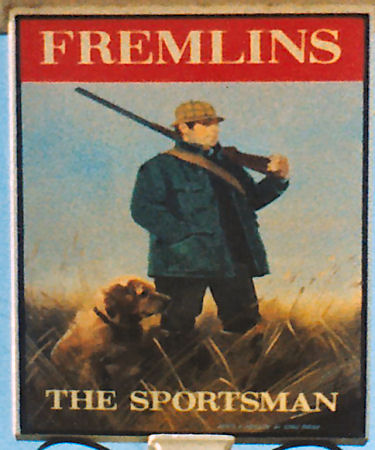 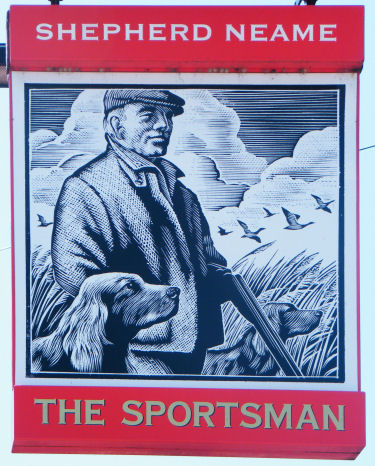
Above sign left, October 1986.
With thanks from Brian Curtis
www.innsignsociety.com.
Sign right and photo above by Paul Skelton, 4 July, 2012. |
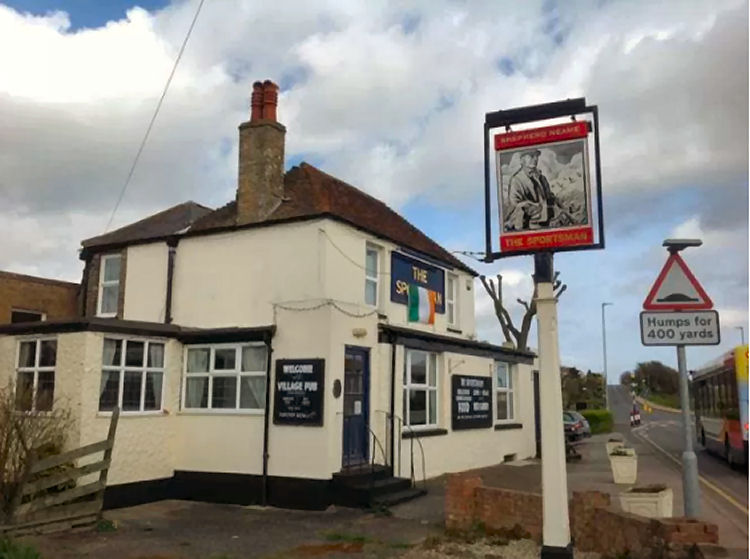
Above photo, 2017. |
Dating back to 1750, the pub used to be a halfway house for stagecoaches
travelling between Ramsgate and Sandwich. Smugglers are believed to have
used its cellar, connected to the area extensive network of tunnels, to
bring in contraband from France. Locals report strange noises and items
being moved, possibly by the ghosts of sailors and pirates who met a bloody
end at the pub.
The 1851 census addressed this as a Hamlet of Great Cliffs End. I believe
it to be the same as the one mentioned in the newspaper report of 20 March,
1772, titled "A Melancholy Occurrence."
|
Kent Herald, 17 April 1845.
On Friday last and inquest was held before T. T. Delasaux, Esq., Coroner at the
"Sportsman" public house, Sandwich Road, on the body of Mr. Richard Walker, late
of Ramsgate, auctioneer, &c., who came by his death under the following
melancholy circumstances.
It appears that on the proceeding Wednesday he had been to Dover with a horse
and light cart to take his son to a situation, as clerk in an office, and on his
return to Sandwich, he stayed a short time to refresh his horse, leaving again
about 9 o'clock, and when about three miles and a half from home, on the
Sandwich flats (a very open and exposed situation,) it is supposed that, from
the incessant rain and snow and violence of the wind, the horse was turned out
of the road down a bank and went into a dike, but it is impossible to say
whether the deceased was killed by being thrown out, or injured; and afterwards,
owing to the darkness of the night and the roughness of the weather, not being
able to find his way into the road again, wandered about until he was quite
exhausted, and the tide, which flowed very high early the following morning,
over took him, and he was drowned. He was, however, found the following morning
at daylight on by one of the coast-guard, dead, lying on his back at some
distance from the horse and cart. The horse was alive, although having been in
the water so many hours with only his just his head out, and is quite recovered.
The jury returned a verdict of "Found drowned." The deceased, who was a man of
very temperate habits, and highly respected by his fellow townsmen as an honest
and upright tradesman, and one who would willingly lend a hand to assist a
neighbour in distress. He has left a widow and seven children to deploy their
lost.
|
|
From the Kentish Gazette, 6 January 1846.
A shocking accident occurred to a lad at Little Cliffs End-green, near
Pegwell, on Friday afternoon last. It appears that four boys had hired a
gun to go out shooting. Finding nothing to shoot at, they were about to
shoot at a mark, when the unfortunate lad, James Ireland, son of David
Ireland, policeman, came to William Hoskins, who had a gun, to borrow
his ramrod. Hoskins was in the act of putting a cap on the nipple of his
gun, Ireland standing before him about a yard off, when by some
mischance the hammer fell; the gun went off, and the whole contents
entered the bowels of poor Ireland, who walked a short distance and
fell. He explained to Mr. Field, who came to his assistance, how the
accident occurred, said it was entirely accidental, and immediately
expired. An inquest took place on Saturday, at the "Sportsman," on the
Sandwich road, before Mr. DeLasaux, coroner, and a respectable jury, who
returned a verdict of "Accidental Death," levying a deodand on the gun
of 10s., cautioning persons not to let out guns to boys, as they thereby
endangered their lives as well as the lives of others.
|
|
Southeastern Gazette, 13 September 1853.
Petty Sessions, Monday.
(Before the Hon. H. S. Law, Rev. G. W. Sicklemore, W. H. St. George,
T. Blackburn, and J. A. Warre, Esqrs.)
Thomas Danton, a labourer in the employ of Mr. Williams, of the
"Sportsman Inn," was charged by Thomas Gambrell, the lessee of the
market tolls, with selling fruit out of the market, in
Addington-place, on the 31st ult.
Fined 1s. and costs 11s. 6d.
|
|
From the Kentish Chronicle, 14 April, 1860.
Henry William Pyle, landlord of the "Sportsman Inn," on the Sandwich
road, appeared to answer a charge preferred against him by the county
constabulary, for having his house open for the sale of beer before
half-past twelve o’clock on the 1st inst.
Police-constable Richard Cullen was called in support of the
information, and proved that about a quarter before twelve o'clock that
morning he knocked and was admitted, and then found two persons inside
with some ale before them; he was in plain clothes.
The defence was that the persons who were there had got admission by
stating to the defendant's son that they were going to Sandwich.
The Bench gave him the benefit of a doubt they had as to whether he
might not have really believed them to be travellers, and dismissed the
case.
|
|
South Eastern Gazette, 17 April, 1860.
Charge against a Publican.
At the Police Court, on Monday, Mr. H. W. Pile, landlord of the
"Sportsman," on Sandwich Flats, was charged with having his house
open for the sale of liquors during the prohibited hours.
Police-constable Cullen, K.C.C., found three men in the tap-room
of the above house, at 12 a.m. on the 11th inst., with some liquor
on the table. On asking defendant’s son who the men were, he was
told that two of them were travellers, and were going to Sandwich,
but about a quarter of an hour afterwards he saw two of the men come
out, go towards Sandwich, and then return. The defendant now said
that he had given his son orders not to serve any persons unless
they were travellers. One of the men out of the three had been
invited there by his son to dine with him. The Rev. G. W. Sicklemore
spoke to the creditable manner in which defendant conducted his
house, which was also admitted by Superintendent Stokes.
The case was dismissed; the defendant saying he should lay the
whole matter before the Secretary of State, and ask him if the
police were authorised in entering his private rooms without a
warrant.
|
|
From the Kentish Chronicle, 28 April, 1860.
PETTY SESSIONS—Monday.
(Before G. E. Hannam and T. Whitehead, Esqrs., the Rev. G. W. Sicklemore,
and Major-Gen. Williams.)
Richard Cullen, a constable belonging to the Kent County Constabulary,
appeared to answer a summons charging him with having, on the 1st inst.,
violated his duty us such constable, by entering the private rooms of
William Henry Pyle, of the "Sportsman Inn." Defendant pleaded not
guilty.
Mr. Superintendent Stokes appeared to watch the case.
Charles Henry Pyle deposed:— I am the son of William Henry Pyle, of the
"Sportsman Inn," in the parish of St. Lawrence. I was in the house on
the 1st inst. (Sunday). I saw the defendant there; he came, to the best
of my recollection, at about a quarter before twelve o’clock; he knocked
at the door, and I let him in. He asked if there was anyone in the
house? He looked in all the rooms, and then asked if he could go
upstairs. I said he could, if he liked, he went up. I followed him,
going up two stairs at a time. I overtook him on the first landing, and
passed him. I opened the doors, and he looked in all the rooms. He did
not ask me to open them. I opened them of my own accord. He looked into
the rooms, but did not go into them.
Cross-examined by defendant: I don’t remember your asking me whether I
had a private room upstairs, I was not coming out of the house when you
came to the door.
Mr. Superintendent Stokes, to witness: What was Cullen’s conduct toward
you?
Witness:- Perfectly courteous; he was not at all uncivil.
William Henry Pyle, in a very excited manner, said— I do not accuse him
of anything. I commend the police for doing their duty. But what I want
to know is this, whether I am to subjected every Sunday to the annoyance
of having my private rooms entered and searched in a very un-English
manner? I'll not endure it; they shall not do it again.
The Rev. Mr. Sicklemore said that it did not appear that the constable's
conduct was in question at all. It had been admitted that what he did he
did with courtesy and with their consent. The only point to decide was
whether he had the right to enter every room in the house.
The Court was cleared, and after a very short consultation, the public
were again admitted, when Mr. Hannam said that the magistrates were of
opinion that a constable has the perfect right to enter every room in a
publican’s house, but, at the same time, he must use discretion, and not
do it offensively.
Pyle, sen.:- I have endeavoured to keep a respectable house, and when I
cannot do it. I'll give it up, but I cannot stand such annoyances.
Mr. Sicklemore: You must bear in mind that you are licensed to do what
other people cannot do in their houses. You divest your house of the
nature of a private house, and, therefore, for the advantage you have
another way, you must comply with the proper regulations.
Pylr, sen.:- There was Mr. Livick, at the last hearing, interfering; what
right has he with me? I will let him see that I am not to be played
with.
Mr. Hannam said he could not allow such temper to be exhibited in the
Court.
The matter then dropped.
|
|
South Eastern Gazette, 15 May, 1860.
The Police and the Publicans.
A reply has been received from the Home Office, in answer to the
complaint of Mr. H. W. Pyle, of the "Sportsman Inn," St. Lawrence,
that the police had entered his private rooms without a warrant,
searching for persons supposed to be on the premises during the
hours of divine service, on Sunday. The communication briefly
intimates that Sir George Lewis has made enquiry into the matter,
and that no further notice can be taken of the complaint.
|
|
From the Kentish Chronicle, 6 April, 1861.
The Ramsgate Artillery Corps assembled on parade on Tuesday afternoon,
and proceeded under the command of Capt. Cuttler to the “Sportsman Inn”
on the Sandwich road, for carbine practice. They marched back in the
evening, preceded by the band of the Deal Rifles, which had kindly
volunteered its services.
|
|
From the Kentish Chronicle and General Advertiser, 1 March, 1862. Price 1 1/2d.
RAMSGATE.
A running match took place on Tuesday afternoon, at the “Sportsman,”
between Artillery Corps and Cherry, of Islington for £5 a side. The
distance was one hundred yards, on the hill leading to the “Sportsman.”
The start took place about two o’clock, and the race ended in favour of
Cherry, who beat his opponent by a few yards. Notwithstanding the
coldness of the day, there were about two hundred persons present.
|
|
From the Reynold's Newspaper, 2 August 1863.
MAN DROWNED IN PEGWELL BAY.
On Wednesday afternoon, Sir. W P. Gallaway, deputy coroner for East
Kent, held an inquest at the "Sportsman's Inn," St Laurence, near
Ramsgate, on the body of George Richard Dale, a young man, eighteen
years of age, a saddler, residing at Newport court, London, who came by
his death, under the following circumstances:— On Monday morning the
deceased left London for Dover, where he was joined in the evening by a
friend named Frederick Bowler, a clerk of twenty five, Leighton (Lisson?)
Grove, London, and it was their intention to go on a tour for eight or
nine days. They started from Dover at seven on Monday morning, with the
view of making their way to Ramsgate on foot. They paid a visit to
Walmer, and continued their journey, and it being low water they walked
along the shore for some little time. They then thought they should save
a long distance by crossing Pegwell Bay, which they resolved to do, and
arrived within a mile of the shore when the calamity happened. It is
necessary here to state that the river Stour crosses the bay, and on the
side nearest Dover or Deal there is a bank of sand, which at low water
forms an island. The deceased and his friend had reached this bank, and
than to their surprise they came to the river, but not knowing what it
was they took off their shoes and stockings and attempted to wade it.
This they found was impossible, and they therefore returned, took off
their trousers, and again attempted to cross the river, but still they
were unable to do so, the water being too deep. During this time the
water had been flowing very fast, and when they returned to the bank a
second time it was nearly covered with water. The tide then encroached
upon them very quickly, and the deceased being unable to swim lost his
life, and his body was picked up on the bank of the river, by a
fisherman. The deceased's friend managed to keep on the bank until
assistance came, and then he was brought safely ashore, but had lost
nearly all his clothes (having taken them off to enable him to swim) as
well as a small travelling bag. The necessary evidence having been taken
at the inquest, the jury returned a verdict of "Accidentally drowned."
|
|
From the Deal, Walmer, and Sandwich Mercury,
20 March, 1872. 1d.
A MELANCHOLY OCCURRENCE
An inquest was held on Wednesday afternoon, at the "Sportsman Inn,"
St. Lawrence, before T. T. Delasaux, Esq., County Coroner, and a
Jury, of whom Mr. Robert Powell was foreman, on the body of Herbert
Gillow, aged 32 years, who resided at Minster, and who was found lying
in a ditch near the "Sportsman Inn," about six o'clock the same morning.
Edward Bax, shepherd, living at St. Lawrence, deposed: About six
o'clock this morning I was looking my sheep round a dyke in the parish
of St. Lawrence, when I saw the deceased lying in a ditch. I obtained
the assistance of a constable, and we then took him out of the ditch. He
was lying on his stomach, and when taken out he was quite dead. The top
of his head was just covered by water, and I believe death was caused by
suffocation. When the deceased was taken out of the ditch I recognised
deceased as Herbert Gillow. Deceased was dead when I first saw him.
Several questions were put to this witness by the jury, and from his
answers it appeared that when he first saw the body he did not ascertain
whether or not life was extinct. Bax, however, said he was positive that
the deceased was dead, but he also stated that one of the reasons for
not touching the body was that he was afraid if the deceased had been
known to have had any money about him, and if nothing had been found
upon him when he was searched, people might have said he had taken it.
P.C. Hogwood, stationed at St. Lawrence, deposed: This morning I
received information that the body of a person had been found in the
marshes near the "Sportsman." I proceeded to the spot and I found that
the body was quite cold and stiff. Deceased had evidently been dead for
some hours. I searched him, and found upon him 2½d.
in coppers and a latch key. His cap was in his right hand pocket. He had
two white pocket-handkerchiefs.
B. Nash, gardener, Minster, deposed: I knew the
deceased, and I last saw him alive at about five o'clock last evening.
He was in very good spirits, and appeared as usual. He paid me 2s. I
noticed he had some gold and silver mixed in a small purse. I saw a
sovereign and a half and some silver.
Ruth White, cook at the deceased house in the
parish of Minster, deposed: I am in the service of deceased's sister's,
and the deceased lived there with them. I have been cook in the
establishment for about two years and eight months. About half-past nine
last night, defendant went out, and he asked his sister to put the latch
up, so he might be able to open the door with his key. His sister did
so. It was unusual for him to go out at that time. He was always very
quiet, and last evening he appeared to be about as usual.
James Lane, gardener to B. Sicklemore, Esq., of
Cleve, Monkton, deposed that he last saw the deceased alive about nine
o'clock on the previous night at the "Mount Pleasant Inn." he was
perfectly sober but appeared dull, and he hardly spoke to anyone.
The Coroner briefly summed up the case, and
suggested to the jury that the safest thing for them to do would be to
return an open verdict.
The Jury accordingly returned a verdict if "Found
Drowned."
|
|
Thanet Advertiser, Saturday 6 July 1872.
Thomas Bax, a labourer, was summoned, charged with having, on the
16th of June, neglected to quit the
"Sportsman Inn," Pegwell, when requested to do so.
Defendant pleaded not guilty.
Esther Jane King deposed that she was barmaid at the "Sportsman Inn"
in the parish of St. Lawrence, kept by
W. H. Pyle. On Sunday, 16th June, about 7:40 a.m., defendant, who
lived in a cottage adjoining came and asked
for a half pint of beer. She refused to serve him, telling him she
had strict orders not to serve anyone during the
prohibited hours. Defendant then made use of very bad language, both
to her and Mrs. Pyle, and refused to go.
Mrs. Pyle gave similar evidence.
Defendant was fined 2s 6d. and 10s. costs.
|
|
From the Whitstable Times and Herne bay Herald, 28 September, 1889.
PEGWELL BAY. SHOCKING DISCOVERY.
The East Kent Coroner, R. M. Mercer, Esq , held an inquest at the
"Sportsman Inn," Minster, on Friday afternoon, on the body of a man
unknown, whose body was discovered at Pegwell Bay. (Click
for details.)
|
|
Thanet Advertiser - Saturday 06 June 1896.
DEATH. RAMSGATE.
May 29, at the "Sportsman's Inn," Cliff's End, St. Lawrence, Frederick
William Ambrose, aged 35.
|
|
From the Thanet Advertiser, Saturday 12 May 1900.
The licence of the Sportsman.
At the county Petty sessions on Tuesday, Mrs. Stannard, widow of the
late Mr. Frank Stannard, of the "Sportsman Inn," Sandwich Road, applied
for the grant to her, as executrix, of the licence of that public house
until next transfer day. The Bench granted the application. Mr. William
James Curtis applied for a temporary authority to sell at the
"Sportsman" till next transfer day, and this the justices also assented
to.
|
|
From the Dover Express and East Kent News, Friday, 22 August, 1913. Price 1d.
HOLDING UP MOTOR CARS WITH A GUN
On Sunday afternoon Mr. William Banger, a well know florist, of Peartree,
Pegwell, was killed by a Dover taxi-cab after he had acted in an
extraordinary manner in attempting to stop motor cars with a gun.
The inquest was held by Dr. Hardman, and Mr. Tremain was foreman of the
Jury.
Mr. J. Thorn Drury, who represented the Dover Motor Company, owners of
the car, expressed their sincere regret at the occurrence.
Evidence of identification was given by Mary Wilder, who stated that
deceased was sixty years of age. He had lived in the same house as
witness, and she had known him about 17 years.
Asked by the Coroner whether deceased had been in the habit of taking
too much to drink, witness said she would rather Dr. Hardman did not ask
her that. Deceased was rather excitable.
The Coroner: One does not want to say anything against a dead man, but
in a matter of this sort there is always a question whether anyone has
been negligent. It has got a bearing on the question whether the motor
car driver was careful or not, or whether it was Mr. Banger's fault.
Witness said she quite understood that. Further questioned, witness said
she saw the deceased at about 2.15 on Sunday afternoon, when she went to
change her blouse. She did not think he had had any too much beer. He
had had half a gallon to take to the nurseries, as he generally did on
Sunday, to give to the men there. He came back with a small barrow, and
was quite sober then. He was rather cross with her little boy because he
had not put up a ticket on some apples. Witness had never heard deceased
say anything about taking his own life. He was rather too careful for
that.
Frederick Walter Ryder, driver of the car, said that he was employed by
the Dover Motor Company, Ltd. On Sunday he was driving one of their
small taxis, and had two passengers. He was going towards Dover from
Margate, having been on a circular trip to Canterbury. He was in no
hurry, and had no object in putting on speed. The passengers had asked
for a careful driver, and they particularly wanted him to go slowly. He
had two hours in which to do eighteen miles. Witness had driven for
three years, and he produced his licence, which was clean. On Sunday he
was within a few hundred yards of the “Sportsman Inn” on the Ramsgate
side, and he was going at a steady pace of fifteen to eighteen miles an
hour. Suddenly, about twelve yards in front, deceased darted up. He had
a package in one hand, which was afterwards found to be a gun partly
enveloped in a sack. He used abusive language, darted across the car,
and would not allow witness to pass. Witness applied the brakes and
swerved to avoid the deceased, who threw the gun and some cartridges at
him. Deceased then threw himself at the car. Twice witness swerved, but
each time deceased came again, and then the off-side mud-guard caught
him.
The Coroner asked if deceased was thrown clear of the car?
Witness: No, sir. He seemed to throw himself at the car. I believe he
went right under the car. The tray was slightly bent. I pulled up within
six yards of the man.
The Coroner: had you put on your brakes before?
Witness: Yes. This was the second time I had applied the brakes.
In reply to the Coroner, the Secretary of the Dover Motor Company said
that the passenger in the car were not present, but they would be quite
willing to attend if it were necessary.
Witness said he got down from the car and found that deceased had been
injured in the head, and was unconscious. A Policeman came along and
they put deceased into the car, and conveyed him to the Ramsgate
Hospital as quickly as possible. The road was clear for walking. The
cartridges which deceased had thrown were afterwards found on the body
of the car. Witness heard that deceased had been acting similarly in
front of other cars, and his opinion was that the man was under the
influence of drink. He shouted, “I will shoot you, you _____.” The
deceased did not point the gun at him, but he threw it. Afterwards
witness saw the gun; it was in two sections.
In reply to further questions, witness said the man acted like a madman.
The whole thing seemed intentional. Witness did his best to avoid the
accident.
The Coroner: Was there any earthly reason why this man should have been
run over or run into unless he wanted to be?
Witness: None.
George Sanford, 1, Salisbury Terrace, Haine, said he was walking from
Cliff's End towards the “Sportsman” on Sunday afternoon, about three
o'clock. He noticed a man with a gun who threatened to shoot a motor
cyclist who went by. He also put the gun in the centre of the road in
front of a big motor char-a-banc, and stepped to the side of the road.
He acted the same way before two or three motor cars. Witness should
think deceased had “had a drop of drink or was not in his right senses.”
As the Dover car came along deceased stepped out from the side of the
road. He had the gun in one hand. The driver turned the car to avoid the
deceased, who threw what he had in his hands at the car.
In reply to the Coroner, witness said that as far as he could remember
the gun way lying in the gutter after the accident. It was in two
pieces. Witness did not notice the cartridges.
Deceased brought the accident upon himself. He would not let the driver
get out of the way. Witness said that he should have gone for deceased.
He thought a man would have more common sense than to stand in front of
a motor car like that.
The Coroner: You have to consider the case of a blind man. A driver must
avoid an accident if he can.
Witness: I saw this man, and if I have known that he was going into the
motor as he did I would have run up and pulled him out.
Samuel G. Banger, a nephew of the deceased, said he last saw his uncle
alive at 2.15 on Sunday opposite the Convalescent Home at Pegwell. He
had not got the gun then, although witness knew he had one. Witness
thought that his uncle got the gun from the stables. He had several
places where he could keep it. Witness saw his uncle going to Cliif's
End, where he had some land. His uncle beckoned him across the road, and
then said, “I have got a pretty lot round home. I am going to clear off
down to Cliff's End.” He was perfectly sober, but seemed upset. Witness
had not known him to be so sensible as when he had been recently. He had
known deceased all his life. He seemed very peculiar, and appeared to be
unhappy at home. With regard to the drink, witness had never known the
deceased to be more steady than he had been latterly.
The Coroner: Was he an excitable man?
Witness: very much so.
The Coroner: Have you ever known him so excited as to be off his head
for a time with anything?
Witness: No; only with drink he has sometimes been that way inclined.
The Coroner asked witness whether he thought that, in these periods of
excitement his uncle lost control of himself.
Witness was of opinion that his uncle was upset and hasty, and might,
all at once, have done what the driver of the motor had said. He
believed that his uncle had gone off with the idea of shooting rabbits.
The Coroner: Would a man going rabbit shooting carry a gun in a bag like
that?
Witness: Had he a licence. That is the question.
Questioned by Inspector Lawrence, of the Kent County Constabulary,
witness admitted that he did remark to his brother on Sunday that uncle
seemed a bit hasty, and that he (witness) would not be surprised if they
heard, within twenty-four hours, that his uncle had done something. He
had never seen deceased so agitated.
Police-constable Ayres, K.C.C., said that he was on the Sandwich Road
about 400 yards from the spot where the deceased was knocked down. A
passing motorist informed him of the accident, and he mounted his
bicycle and rode to the spot. He found the deceased lying on the side of
the road with the car about six yards off. Realising that the condition
of deceased was serious , witness had him put into the car and taken
straight to the Hospital. He had not seen the deceased before on that
day. Witness had the gun and five cartridges handed to him. The story
told by the driver at the time of the accident agreed with the version
given in evidence. The driver seemed upset.
Dr. Honeymoon, House Surgeon, Ramsgate General Hospital, said deceased
when admitted at 3.30 in the afternoon, was suffering from a fracture of
the right upper arm, and had some very big cuts and a scalp wound with
an indented fracture of the skull. He was also bleeding slightly from
the nose.
The Coroner: Did you detect any smell of liquor?
Witness said he did not. He believed that about nine o'clock deceased
seemed to recognise the nurses, and two hours later, when one of the
nurses asked him how he felt, he said, “All right.” He added he would
like something to drink if he could get it. He died at 1.45 a.m., the
cause of death being shock from the wounds and fracture of the skull.
The Coroner said it was sometimes necessary in cases of that kind for
the Jury to consider carefully the entire circumstances with a view to
arriving at a conclusion whether the driver of the vehicle which was the
cause of the accident had exercised due care. In that case the
circumstances were very peculiar. The evidence pointed, without
contradiction, to the deceased man being in a state of mind by which he
was not responsible for his actions. It was always satisfactory in a
case of that kind to think that the driver of a motor car had not been
to blame. The point for the Jury to consider was what form their verdict
was going to take. If they took a certain view they might call it an
accident; if they took a certain other view it might be called suicide.
The Jury, after a short deliberation, returned a verdict that deceased
died from the result of an accident, and that the driver of the motor
car was in no way to blame, but, on the contrary, did his very best to
avoid the accident.
|
|
From the Thanet Advertiser and Echo, 17 April, 1934.
BOYS CLIFF FALL. LUCKY ESCAPE AT PEGWELL.
A lucky escape from serious injury was experienced by a
thirteen-year-old boy on Sunday afternoon, when he fell from a height of
20 feet whilst descending the cliff a short distance on the Ramsgate
side of the Sportsman Inn at Cliffsend.
The accident occurred at about 3.30, and the boy, Thomas Cornwall, of
No. 4, Rose-cottages, Haine, had set out with a friend, Douglas
Christopher Silk, to descend the cliff by means of a path. The paths at
that point, although rough and steep, are accessible and the boys had
descended a few feet when Cornwall stumbled and fell on to the rocks and
rough stones below, a distance of about 20 feet. It appeared that he
landed on his side, and upon examination at the hospital he was found to
be suffering from a dislocated shoulder and abrasions.
Silk, on seeing his friend’s plight, descended and helped the boy to the
residence at Cliffsend of P.C. Whitehead, who conveyed him to the
Ramsgate General Hospital.
|
|
From the Advertiser and Echo, 19 October, 1934.
ANGLERS ABANDON BOAT AND WADE ASHORE AT PEGWELL BAY.
Exhausted after a three hours' battle with the rough sea which was
raging on Tuesday afternoon, three young men abandoned their 16ft. craft
in Pegwell Bay, and, with water up to their armpits, succeeded in wading
ashore near the "Sportsman Inn."
The three men were Sidney Albert French, aged 20, of new Street, Ash.
Frederick Charles Driscoll, aged 24, of Park Villas, Eastry, and George
Edward Castle, aged 22, of 22, King Street, Sandwich.
In the boat the Catherine, which was partly owned by one of them, the
three spent the day fishing off Ramsgate on Sunday, but decided to leave
the boat in the harbour and return for it later in the week. On Tuesday,
at about three o'clock, they left the harbour, intending to cross the
bay and take the boat up the river to Sandwich. The first mishap
occurred when the sail, which they hoisted as soon as they were outside
the harbour, blew away, leaving them to make the best headway they could
with the oars.
It look them nearly three hours to reach a point opposite Pegwell Home,
and by this time their hands were terribly blistered. Of the three
Driscoll was the only one who could swim. but ascertaining that the
water was fairly shallow, they decided to endeavour to wade ashore,
making for the other side of the bay.
This they succeeded in doing and at the "Sportsman Inn" their wants were
attended to, while P.C. Whitehead put them on a bus for Sandwich.
The Catherine was last seen that night drifting away to sea, but on
Wednesday morning it was discovered by P.C. Whitehead at Shingle End,
about three hundred yards on the Deal side of the Stour estuary.
|
|
East Kent Times and Mail, Wednesday 31 August 1938.
Yacht sinks in Pegwell Bay.
Two men swim ashore and crawl to phone kiosk.
Exhausted by a lengthy struggle through 2 miles of bitterly cold
water, two London men whose yacht had sunk in Pegwell Bay, crawled
to a phone kiosk near the "Sportsmans Inn," Cliffsend, in the small
hours of Tuesday morning and gasped out a call for assistance.
Police officers and ambulance men, who rushed by car to the kiosk,
found the men in a collapsed condition on the floor.
Their names are Robert Stewart Douglas Simpson (36), a ship's
officer, of 29 Mycenac Road, Blackheath Common, London, and Thomas
Todd (26), an insurance clerk, of 24 Mycenac Road, Blackheath. They
were conveyed to the Ramsgate General Hospital in the motor
ambulance and detained suffering from shock and exposure.
Mr. Simpson is the owner of the sailing yacht, "Van Rita," and it
was in this craft that the two men left Ramsgate Harbour shortly
before midnight on Monday, intending to make Rye. A strong tide
cause them to put about and run once more for the shelter of the
harbour.
They then encountered a head wind which necessitated frequent tacks
and it was during one of these that the yacht struck what is
believed to be a submerged wreck.
In an interview at the hospital on Tuesday morning, Mr. Simpson told
of the predicament which with which he and Mr. Todd were faced.
"The yacht was holed badly," he said, "and although we tried to fill
the hole with rags, we failed and our craft sank in about 4 feet of
water.
"We waded chest deep for a considerable distance and then we came to
deep water where we had to swim. This must have been the River
Stour. It was dark, of course, but occasionally we saw the lights of
cars passing along the Sandwich road and we made for that direction.
Struggling through the mud we eventually reached the shore and
managed to crawl to the phone kiosk.
"It was fortunate we did not have to swim all the way, for Mr. Todd
is not an expert swimmer and the water was bitterly cold."
Hot baths and warm blankets were quickly provided at the hospital
when the men had been divested of their mud-sodden clothing, and
later on Tuesday both of them were fairly comfortable.
The sinking of the "Van Rita" has placed Mr. Simpson and Mr. Todd in
something of a quandary, for the cabin contains many of their
personal belongings and papers and most of their money. At present
it is uncertain whether or not it will be possible to salvage the
yacht.
|
|
Thanet Times, Tuesday 5 January, 1965.
The "Sportsman" is a popular rendezvous.
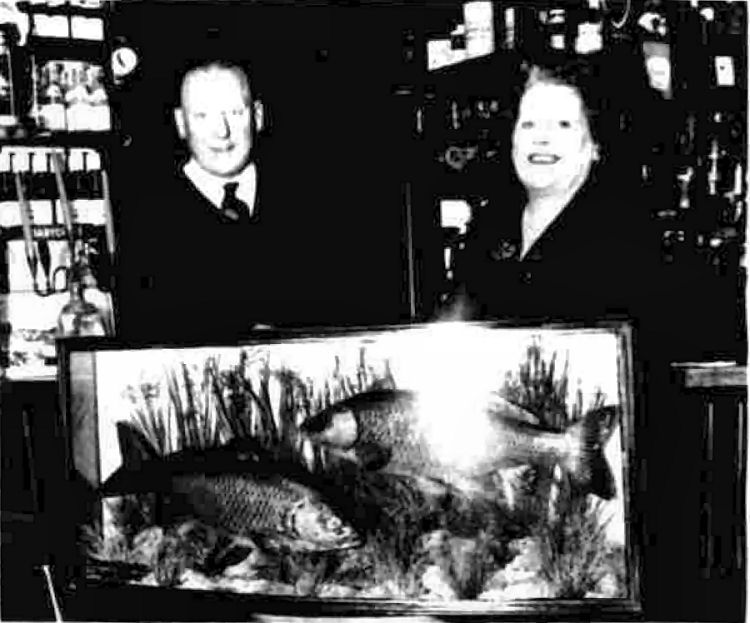
Mine host at the "Sportsman Inn," Cliffsend, Ramsgate, is
sportsman Mr. Tommy Robinson, an ex-footballer. He played for
Ramsgate town and for Margate between the wars, and with Torquay and
Derby, his native County.
14 years.
Mr. Robinson and his wife Eva, have been at the "Sportsman" for
more than 14 years, since October 1950, in fact. Before the war they
were at the Paragon Corner House on the seafront at Ramsgate and
they have also been in the trade at Folkestone.
Mr. Robinson a native of Burton-on-Trent, is licensee of a house
which many years ago was a popular stop on the road from Ramsgate to
Sandwich.
"I think this was originally a farmhouse, and we have photographs
showing ostlers and other good people who called here," said Mr.
Robinson.
Recalling his footballing days, he said:- "When I was with
Ramsgate Town we used to play on the Old St. Luke's ground at
Dumpton."
Busy time.
The "Sportsman" is still a popular rendezvous and the Cliffsend
area has undergone extensive redevelopment since Mr. and Mrs.
Robinson moved in.
They are busy catering for visiting holiday makers and passing
motorists, in addition to the local regular customers.
|
|
From the
http://theisleofthanetnews.com 2 Apr, 2017. ByKathy Bailes.
Last orders for The Sportsman.

The Sportsman in Cliffsend calls last orders for the final time today.
Today (Sunday, April 2) is the last day customers will be able to go
through the doors of the "Sportsman" pub at Cliffsend.
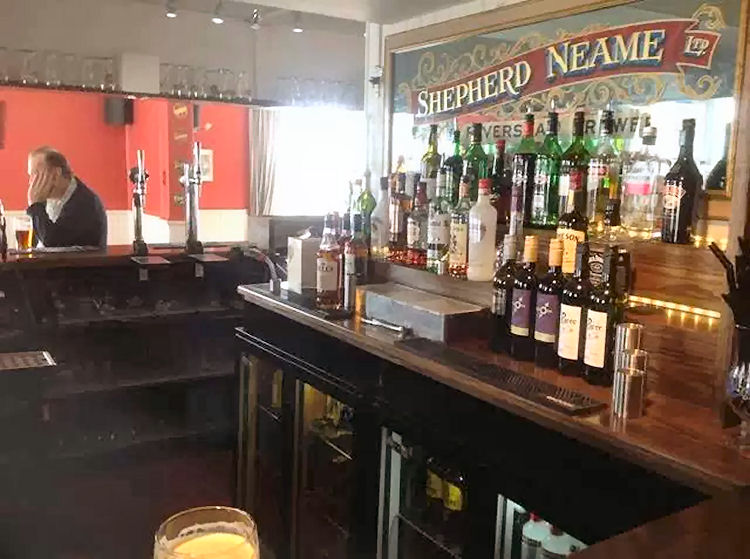
The village boozer, run by Teresa Kirk and Ronnie Mark, is calling last
orders for good after being put on the market with a guide price of
£250,000 plus VAT.
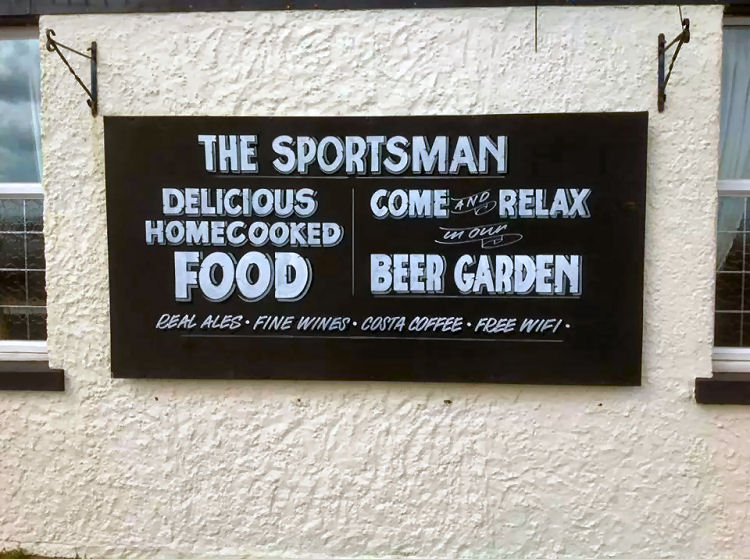
The restaurant shut last month and some utilities, including the phone
line, are believed to have been shut down yesterday (April 1).
It is believed the Shepherd Neame pub will be flattened and housing will
be built on the site, which includes a car parking area.
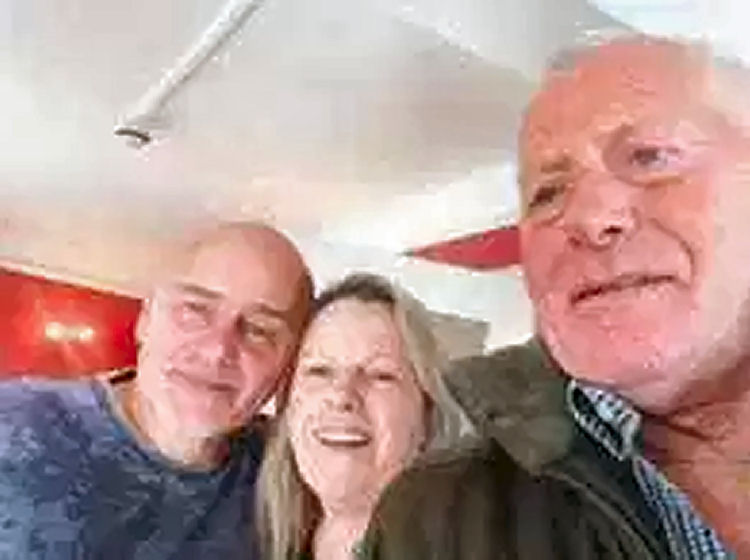
Ronnie, Teresa and Trevor.
Parts of the Sandwich Road pub’s original building date back to 1750.
The closure will leave the village without a local pub.
Ramsgate mayor Trevor Shonk said the rerouting of traffic to the East
Kent Access Road, bypassing Sandwich Road, had sounded the death knell
for the business.
Cllr Shonk said: “I have visited this public house for 40 years. It’s
been a great meeting place for car clubs, motorcycle clubs, and for food
and beers.
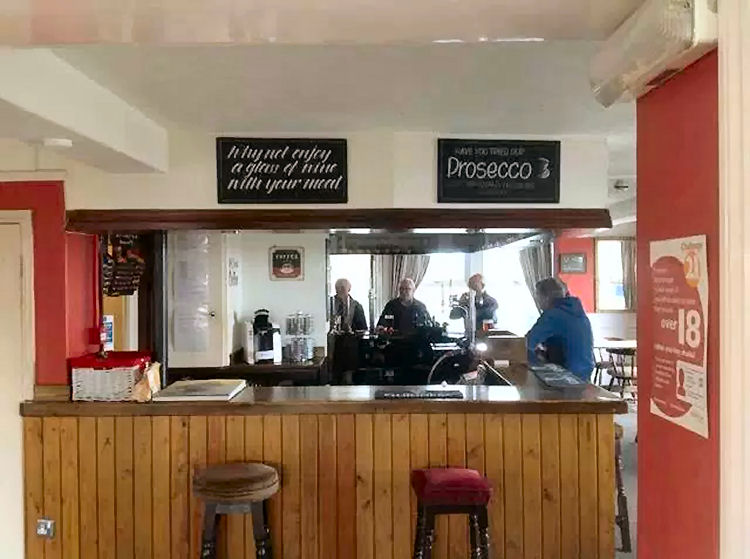
“Teresa and Ronnie are great hosts. This pub goes back to 1750 and was
named the "Sportsman" because young men went there in the 1800s for rifle
practice.
A great disservice has been dealt to Cliffsend by the closure of the
"Sportsman" public house, this was a Thompson and Wooten house.
“It seems all traces of our local history is being erased. It is a sad
day for villagers.”
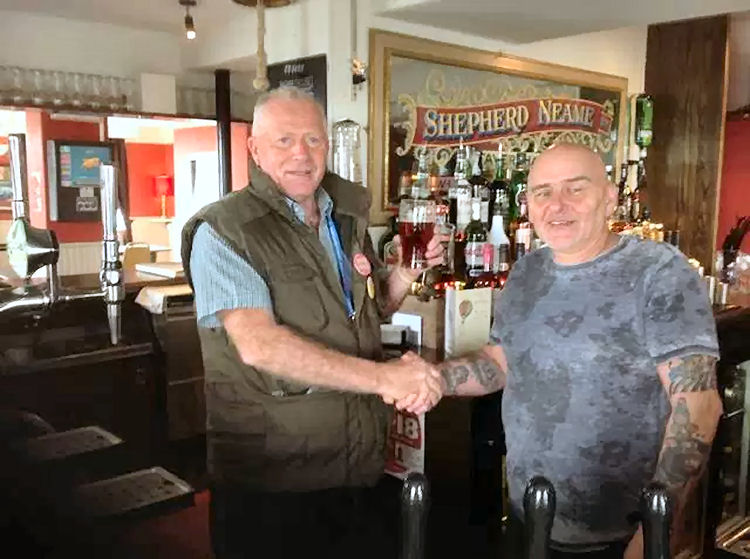
|
I believe the premises has been sold off to a developer.
Latest news is planning has been submitted March 2019 for conversion to 9
X 2 apartments, 2 X office units, 1 X cycle café, 27 parking spaces, 4
storey building.
|
From the
https://theisleofthanetnews.com By Margaret Cox, 30 June 2019.
Plan to turn former Sportsman pub in Cliffsend into flats and micropub is refused.
Plans to turn a former boozer in Cliffsend into flats, a micropub
and cycle cafe have been turned down by district planners.
Development firm Kentish Projects Ltd, the company behind the Beach
Retreat flats on Ramsgate seafront and Royal Harbour View off
Liverpool Lawn, wanted to transform The Sportsman Inn, which shut in
2017.
The proposal was for two apartment blocks of three and four storeys
containing nine flats, office space, a cycle cafe and micropub to
replace the former pub on Sandwich Road and land around it.
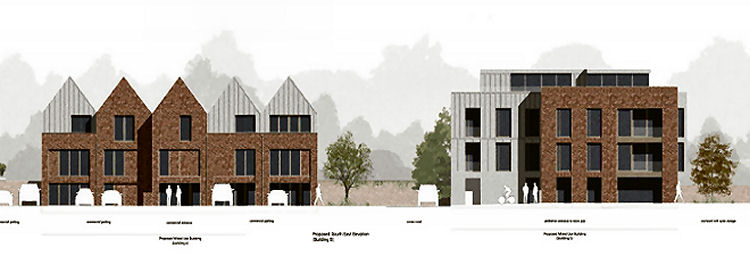
An image of how the development might have looked. Credit: Hume
Planning Consultancy Ltd.
But this week Thanet District Council refused the plan on a number
of grounds, including it being “an obtrusive form of development”.
Hume Planning Consultancy, the agent for Kentish Projects, said in a
planning statement the building is vacant and the land a prominent
brownfield site in a sustainable location.
“It is therefore considered that this redevelopment offers the
opportunity for a visual enhancement to the character of the area,”
a spokesman said.
“This proposal will deliver investment at the site and create an
attractive building.
“The existing ground floor pub will be replaced by a modern cycle
café which will have significantly reduced running costs and could
serve as a community meeting place and hub.
“Because the ground floor level would not be suitable for
residential accommodation following flood risk advice, the proposal
includes office floorspace that will be occupied by two growing
Thanet companies.
“The upper levels of the building will provide nine apartments which
will make a contribution to local need.”
The plan received one letter of support and 11 objections from the
public as well as an objection from Cliffsend Parish Council.
Residents argued the development was not in keeping with the area
and could impact views due to it being too high.
Concerns were also raised about flood risk and drainage.
In a decision notice by Thanet council, town planner Gill Richardson
listed five reasons for the refusal, including the proposed
development being visually dominant and obtrusive, and would create
loss of privacy and light to other residents.
She pointed out it would also create increased pressure on the
Thanet coast, Sandwich Bay Special Protection Area and Sandwich Bay
and Hacklinge Marshes Site of Special Scientific Interest.
“On balance, it is not considered that the benefits of the proposed
development outweigh the demonstrable harm to the character and
appearance of the surrounding area,” she added.
The Sportsman, a Shepherd Neame pub, was run by Teresa Kirk and
Ronnie Mark before it shut in April 2017.
|
|
From the
https://www.kentonline.co.uk By Marijke Hall, 13 September 2020.
Plan for former pub The Sportsman in Cliffsend to be flattened to make way for homes, a cycle café and micropub.
A former village boozer could be flattened to make way for new homes, a cycle café and micropub.
The Sportsman in Sandwich Road, Cliffsend , which was run by
Shepherd Neame, has been at the centre of controversial plans since
its closure three years ago.
In 2018, proposals were submitted by Kentish Projects Ltd, the
company behind a number of luxury developments in Thanet, to build
two blocks of flats and a micropub.
But the ambitious scheme failed to win favour, with district
planners refusing the application and then the Planning Inspectorate
dismissing a subsequent appeal.
The design was described as "obtrusive" and residents feared its
height would interrupt views out to Pegwell Bay and across the
nature reserve.
The plan received one letter of support and 11 objections from the
public as well as an objection from Cliffsend Parish Council.
But now the firm has put revised plans in to Thanet District Council
- this time for four semi-detached three-bed houses and a
three-storey apartment block for four two-bed apartments.

A sketch of how the development might look if built. Picture: Hume
Planning/Kentish Projects Ltd.
The block would have a space for a cycle café and micropub on the
ground floor, which the developer believes will revive the lost
community asset of the former pub.
Hume Planning, which is representing Kentish Projects, says the
development size has been reduced to allay previous concerns.
The firm also states the latest design has been put together taking
into account feedback from Thanet council as well as neighbours
during the recent planning hearing on the previous plan.
In the design and access statement, a spokesman for Hume said:
"Given the prominent corner location of the site and its unique
position looking onto Pegwell Bay, its redevelopment presents an
opportunity for giving the site a clear identity, through quality
contemporary architecture and choice of suitable materials which
will enhance the built character of this section of Sandwich Road.
"Furthermore, the proposed development will re-instate the site’s
former function as a community meeting place, providing opportunity
for local employment, as well as delivering much-needed and
sustainably-located family homes and quality apartments."
|
|
From the
https://www.kentlive.news By Harry Higginson, 3 July 2021.
Sportsman pub in Cliffsend to be replaced by seafront affordable housing.
The new Ramsgate development is set to be finished by 2022, with
apartments available on the government's Help to Buy scheme.
Cliffsend's Sportsman Pub, which has been closed since 2017, is
finally set to be redeveloped in a big shakeup for the town's
coastal Sandwich Road neighbourhood.
Building began on the site, which is just down the coastal road
from Ramsgate, on June 28, and is aiming to be completed by July
2022.
With the bulk of the new properties being affordable homes, and
many of them available under Help to Buy, the new development offers
a perfect opportunity for first-time buyers.
The new set of homes will include four, semi-detached, three
bedroom houses, alongside a three storey apartment building with
three apartments per-floor on the upper two levels.
The ground floor will be a commercial space for a cycle cafe,
bringing a focal point to the new set of properties.
Concept art for the new development shows clean, modern
aesthetics, with large windows and green spaces in front of the
semi-detached properties.
It is being developed by Future Homes, a local property developer,
meaning this is very much a home-grown venture.
Future Homes’ Managing Director Martin Sturge said: “We are a
Thanet-based development company and our team has lived and worked
in the area for over 40 years.
"We are really looking forward to getting to know our neighbours and
becoming part of the Cliffsend community.”
The company already has developments in Broadstairs, Ramsgate and
Margate, making the Cliffsend site their latest addition to Thanet's
property market.
The planned 'cycle cafe' will bring a bike bank of 20 cycles,
meaning it provides a welcome stop-off along the Thanet coast for
tourists.
The properties will also boast "stunning views of either the sea or
the fairways of the local golf course," according to the developer's
website.
The houses come with garage parking, two double bedrooms and a
single bedroom, and are ideal for families of four.
The apartments are slightly smaller - but vary in size, and are
described as being perfect for couples or small families, boasting
"astounding sea views, reaching as far as the eye can see."
|
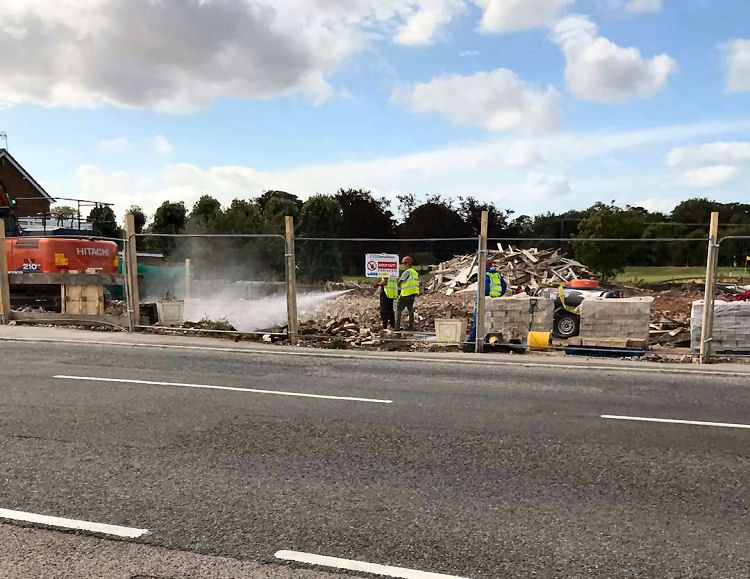
Above photo, 7 August 2021, kindly sent by John Bates. |
|
From the
https://www.kentonline.co.uk By Joe Wright, 9 August 2021.
The Sportsman pub demolished ahead of homes redevelopment at Cliffsend
site between Ramsgate and Sandwich.
A historic pub which stood for centuries has been reduced to a pile
of rubble after bulldozers moved in.
The Sportsman, in Cliffsend outside Ramsgate, is thought to have
dated as far back as 1750 - but the Sandwich Road site is now primed
for seven homes, a new micropub and cycle cafe.
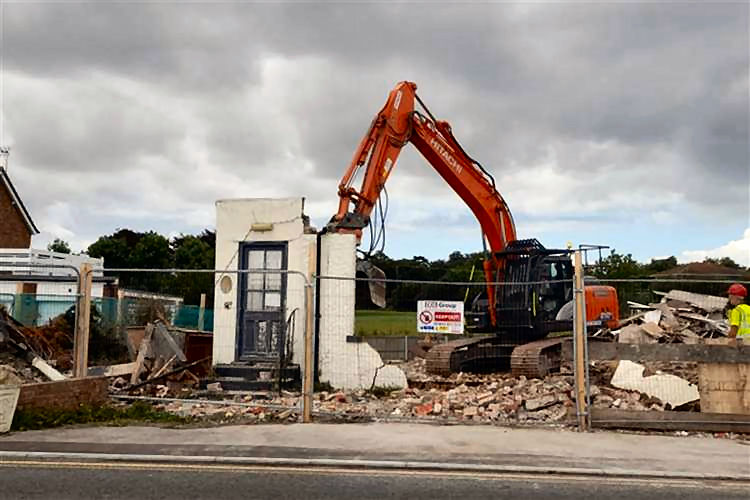
The last remnants of the pub being torn down. Picture: Sarah Emily Wormsley.
Photos show the remnants of the old building being torn down ahead
of building work by east Kent developers Future Homes.
The former Shepherd Neame pub - last run by Teresa Kirk and Ronnie
Mark - closed for the final time in 2017 and was subsequently sold
off.
It was originally a halfway house for stagecoaches travelling
between Ramsgate and Sandwich, while smugglers are believed to have
used the cellar to bring in contraband from France.
The first bid was rejected in 2019, and the decision was upheld by
the Planning Inspectorate following an appeal.
But having revised the proposals, developers were successful at the
second time of asking, with Thanet District Council giving the
go-ahead in February.
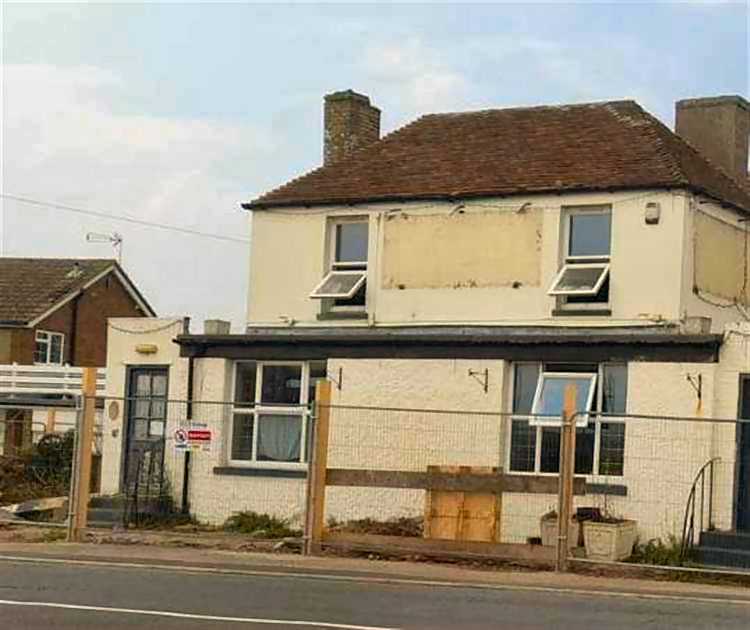
Photographed before the bulldozers moved in. Picture: Sarah Emily
Wormsley.
A host of objectors hit out at the scheme, warning of the impact on
the nearby Pegwell nature reserve, and raising fears over the height
of the apartment block and the resulting strain on community
facilities.
Kent Police also raised concerns amid "significant concerns for the
potential for crime", yet the council looked favourably on the
designs.
Planning officers concluded it would give rise to employment during
the construction phase and through the commercial use, and that the
scheme would support shops and services and increase social
interaction between residents.
Building work for the project is expected to be finished by July
next year.
Four houses are to be built on the footprint of the old pub, while
three apartments will be constructed in a separate three-storey
block.
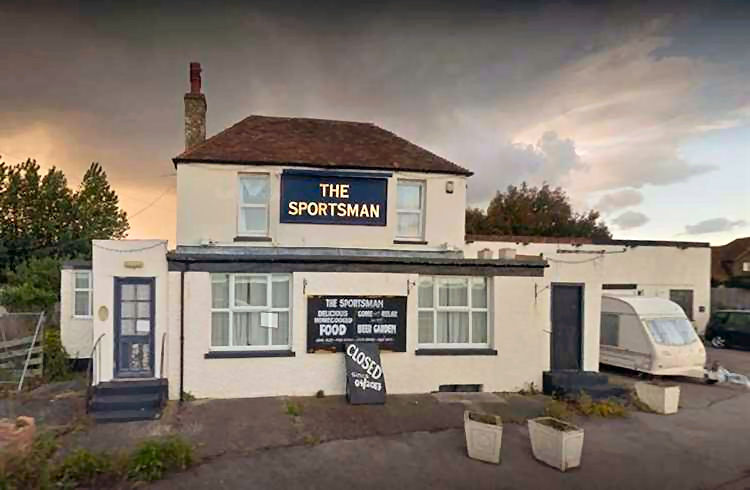
It had been closed for four years.
Last month, managing director of Future Homes, Martin Sturge, said:
“We are a Thanet-based development company and our team has lived
and worked in the area for over 40 years.
“We are really looking forward to getting to know our neighbours and
becoming part of the Cliffsend community.”
|

Above photo showing the excavation of the Sportsman pub in 2021.
Photo kindly sent by Cllr Beryl Harrison. |
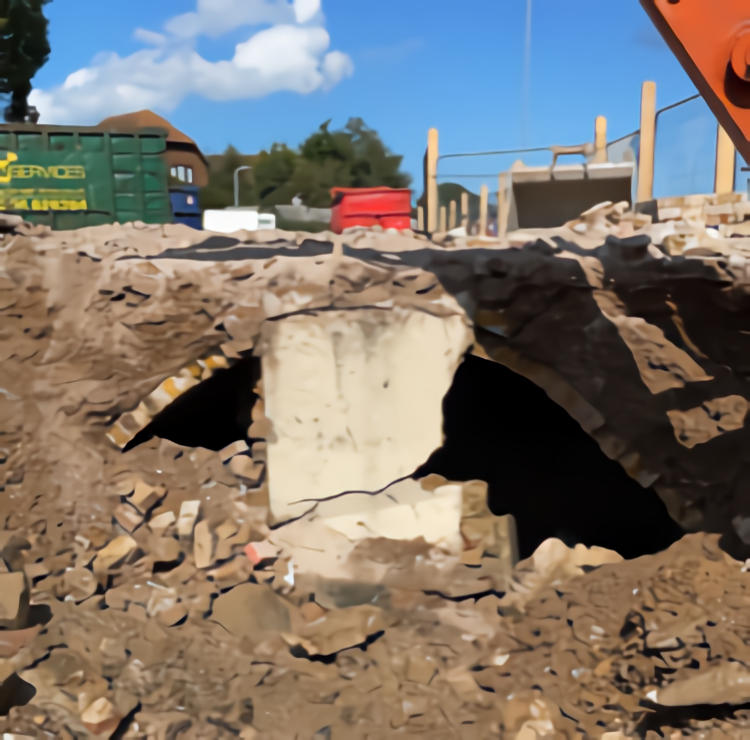
The excavations found a tunnel from the pub that was suggested was
used by smugglers for the storage of their goods and possible an
escape route. Unfortunately the tunnel was not investigated further
and entrance filled and blocked off. Photo kindly sent by Cllr Beryl
Harrison. |
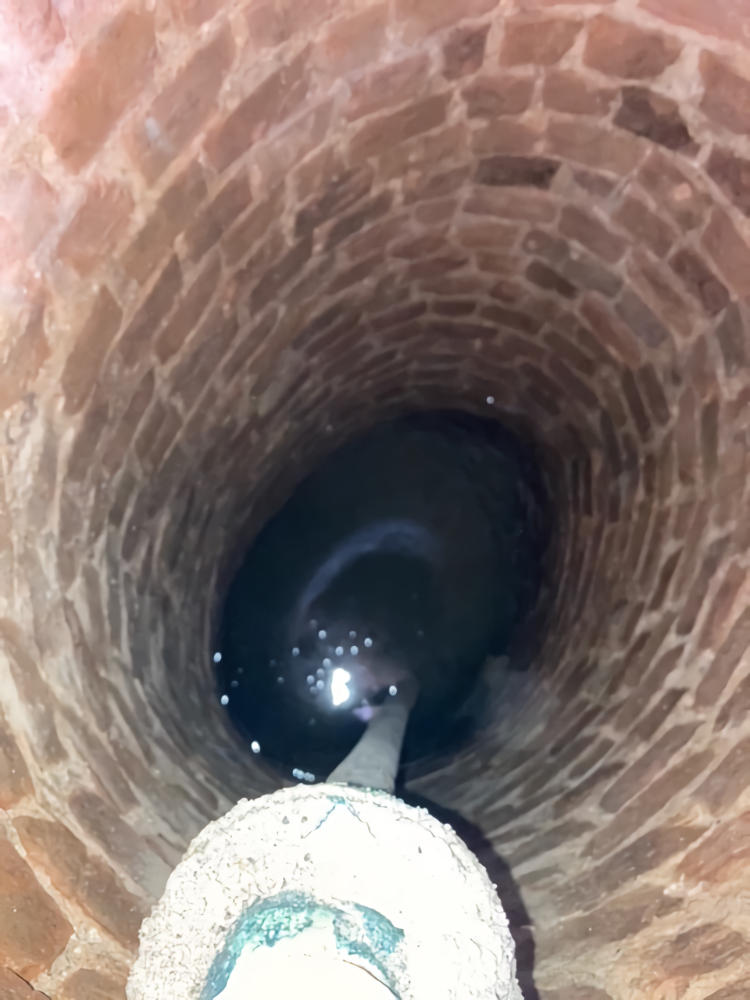
In the cellar of the Sportsman pub was also found a well in very
good condition. Photo kindly sent by Cllr Beryl Harrison. |
LICENSEE LIST
WILLIAMS George 1847-51+ (age 58 in 1851 ) )
WILLIAMS James William 1858+
PYLE Henry William 1860-72+ (also plumber age 65 in 1871 ) )
WILKINSON John 1881-82+ (age 56 in 1881 ) )
TRUMAN Henry George 1890-91+ (age 53 in 1891 ) )
STANNARD Frank to May/1900 dec'd
CURTIS William James May/1900-22+ (age 41 in 1901 ) ) 
BALCOMBE Arthur 1929+
ABBOTT Robert 1930-36+
MILES George E 1938-39+
ROBINSON Tommy C Oct/1950-64+
HAND Jack & Kay 1970s

MARK Ronald & KIRK Teresa to 3/Apr/2017
https://pubwiki.co.uk/Sportsman.shtml
 From the Kelly's Directory 1903 From the Kelly's Directory 1903
 Census Census
|






























